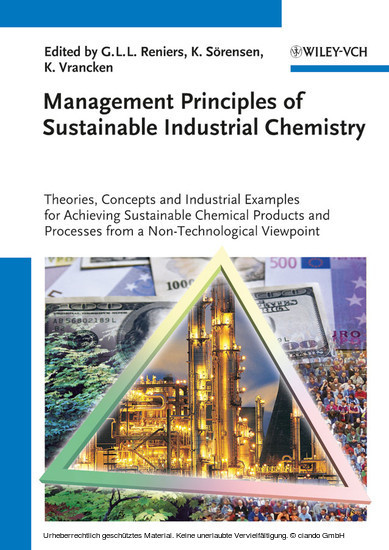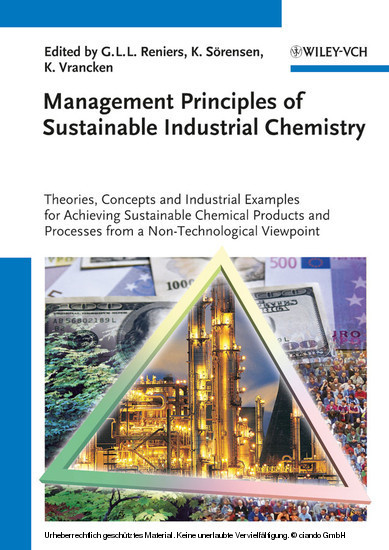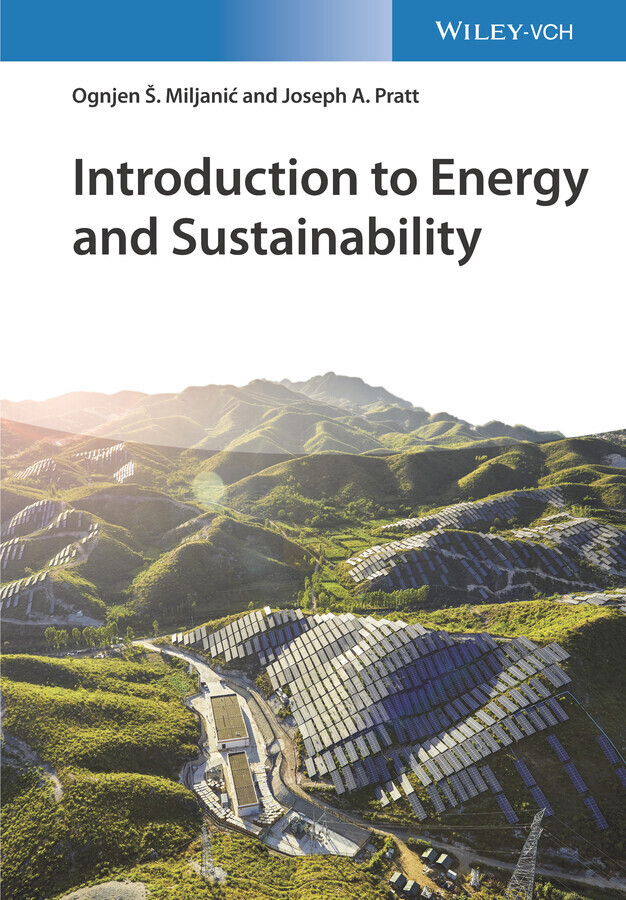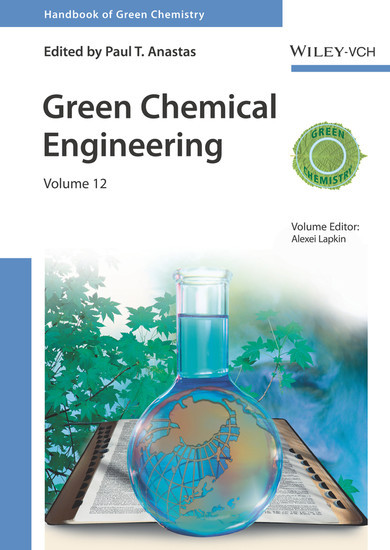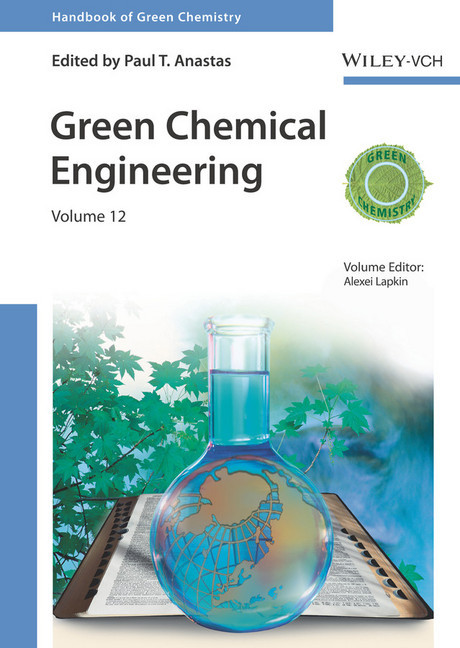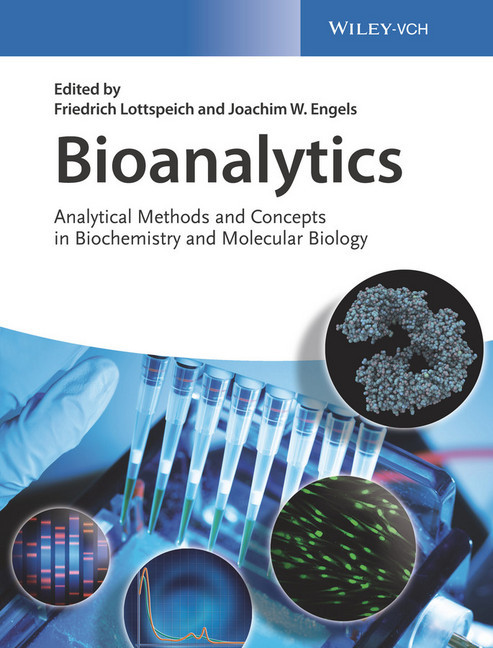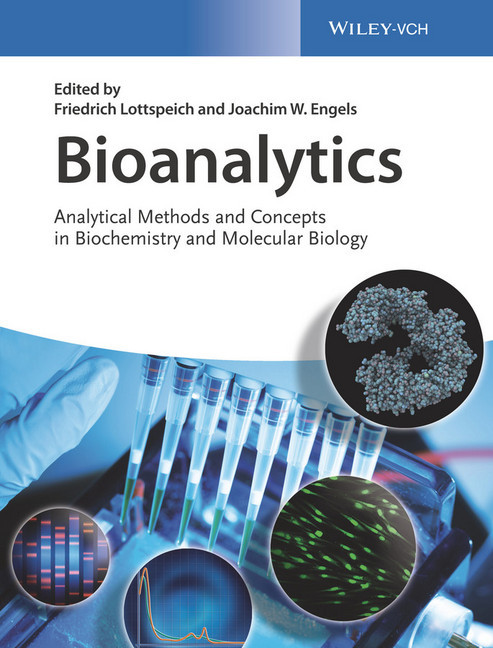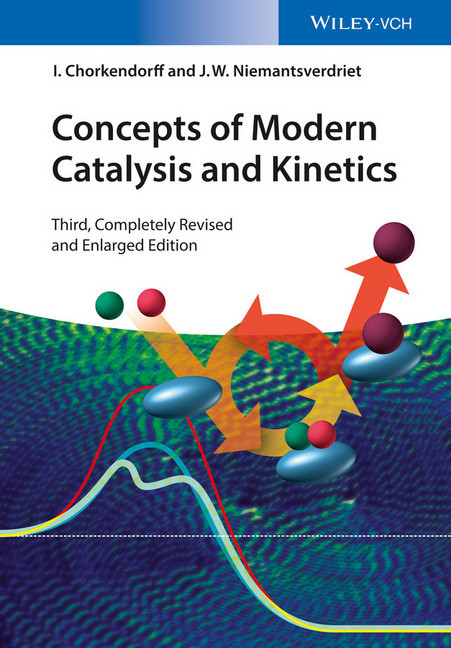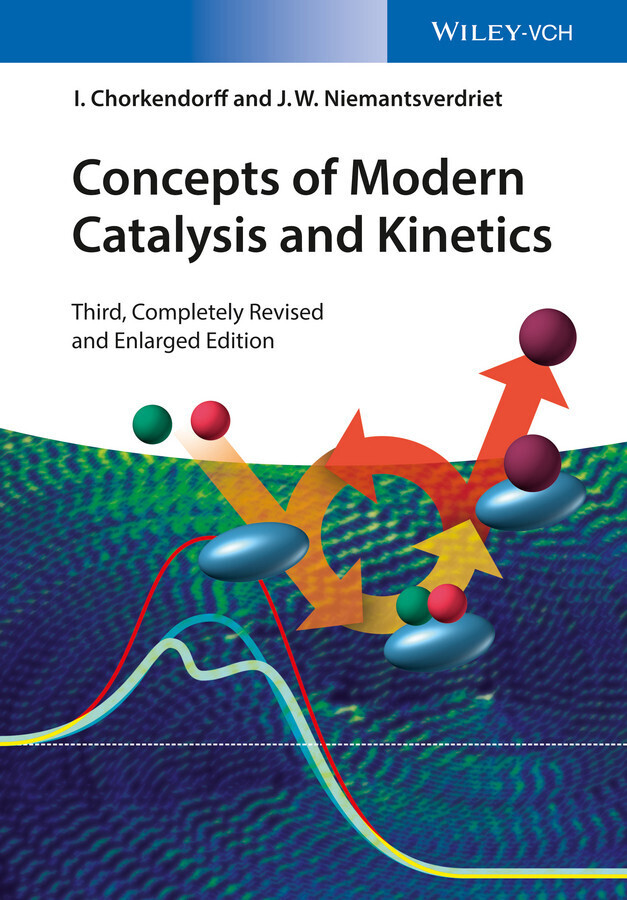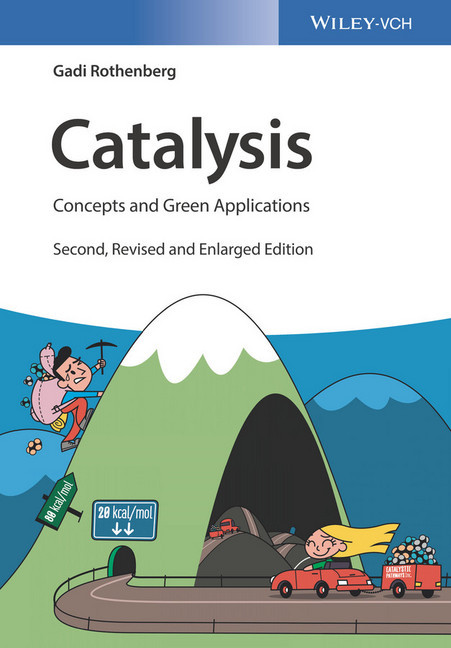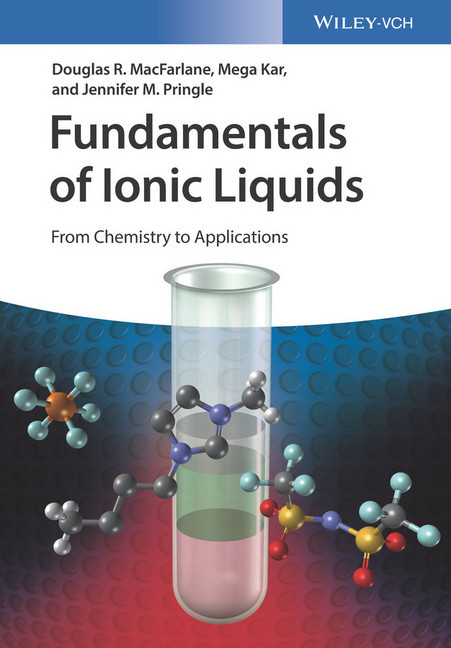Management Principles of Sustainable Industrial Chemistry
Theories, Concepts and Indusstrial Examples for Achieving Sustainable Chemical Products and Processes from a Non-Technological Viewpoint
Management Principles of Sustainable Industrial Chemistry
Theories, Concepts and Indusstrial Examples for Achieving Sustainable Chemical Products and Processes from a Non-Technological Viewpoint
Approaching sustainability from the perspectives of engineering and multiple scientific disciplines, this book incorporates the concepts of intergenerational equity and ecological capabilities, while promoting scientific rigor for the analysis of sustainability and the use of appropriate metrics to determine the comparative merits of alternatives.
The chapters are organized around the key non-technological themes of sustainable industrial chemistry and provide an overview of the managerial principles to enhance sustainability in the chemicals sector. The book strives to provide an intellectual forum and stimulus for defining the roles chemical engineers can play in achieving sustainable development.
Suitable for industry and graduate education, this is the one-stop guide to greener, cleaner, economically viable and more efficient chemical industries.
Genserik Reniers received his PhD in Applied Economic Sciences from the University of Antwerp, after completing a Master`s degree in Chemical Engineering at the Vrije Universiteit Brussels. He lectures in general chemistry, organic chemistry, chemical process technology, industrial processes and thermodynamics at the University of Antwerp, Belgium. He is also visiting professor Risk Management at the Institute of Transport and Maritime Management in Antwerp. At the Hogeschool-Universiteit Brussel in Brussels, Professor Reniers lectures in prevention management, advanced occupational health and safety management and chemical processes/unit operations. His main research interests concern the collaboration and interaction between safety and security topics and socio-economic optimization within the chemical industry. He coordinates the Antwerp Research Group on Safety and Security (ARGoSS), unifying multi-disciplinary safety and security research at the University of Antwerp. He has extensive experience in leading research projects funded both by the Belgian government and the chemical industry. He is a Fellow of the International Congress of Disaster Management, Member of the Society for Risk Analysis and the Royal Flemish Society for Engineers and serves as an Associate Editor for the Journal of Loss Prevention in the Process Industries.
Kenneth Sorensen received his PhD in Applied Economics from the University of Antwerp in 2003. He currently works at the University of Antwerp as a research professor and specializes in Operations Research/Management Science topics, especially optimization in logistics. He has extensive experience in research projects related to this topic and currently supervises several projects and PhD students. Kenneth Sorensen is main coordinator of EU/ME, the largest working group on metaheuristics worldwide and is associate editor for the Journal of Heuristics.
Karl Vrancken is programme manager sustainability assessment and transition at VITO. He became a Doctor of Sciences (Chemistry) at the University of Antwerp in 1995. He worked as a training- and development manager in the environmental industry. He joined VITO in 1997 where he worked as expert and project manager on waste and secondary raw materials and best available techniques (BAT). From 2001 until early 2004 he worked as a Detached National Expert with the European IPPC Bureau in Sevilla (Spain), where, he was responsible for the writing of the BREF (BAT Reference Document) for the Foundries sector. He has a part-time assignment as professor at the University of Antwerp (Department of Bio-Engineering), where he teaches sustainable resources management. At VITO, Karl is heading the multidisciplinary research team on sustainability assessment and transition.
The chapters are organized around the key non-technological themes of sustainable industrial chemistry and provide an overview of the managerial principles to enhance sustainability in the chemicals sector. The book strives to provide an intellectual forum and stimulus for defining the roles chemical engineers can play in achieving sustainable development.
Suitable for industry and graduate education, this is the one-stop guide to greener, cleaner, economically viable and more efficient chemical industries.
Genserik Reniers received his PhD in Applied Economic Sciences from the University of Antwerp, after completing a Master`s degree in Chemical Engineering at the Vrije Universiteit Brussels. He lectures in general chemistry, organic chemistry, chemical process technology, industrial processes and thermodynamics at the University of Antwerp, Belgium. He is also visiting professor Risk Management at the Institute of Transport and Maritime Management in Antwerp. At the Hogeschool-Universiteit Brussel in Brussels, Professor Reniers lectures in prevention management, advanced occupational health and safety management and chemical processes/unit operations. His main research interests concern the collaboration and interaction between safety and security topics and socio-economic optimization within the chemical industry. He coordinates the Antwerp Research Group on Safety and Security (ARGoSS), unifying multi-disciplinary safety and security research at the University of Antwerp. He has extensive experience in leading research projects funded both by the Belgian government and the chemical industry. He is a Fellow of the International Congress of Disaster Management, Member of the Society for Risk Analysis and the Royal Flemish Society for Engineers and serves as an Associate Editor for the Journal of Loss Prevention in the Process Industries.
Kenneth Sorensen received his PhD in Applied Economics from the University of Antwerp in 2003. He currently works at the University of Antwerp as a research professor and specializes in Operations Research/Management Science topics, especially optimization in logistics. He has extensive experience in research projects related to this topic and currently supervises several projects and PhD students. Kenneth Sorensen is main coordinator of EU/ME, the largest working group on metaheuristics worldwide and is associate editor for the Journal of Heuristics.
Karl Vrancken is programme manager sustainability assessment and transition at VITO. He became a Doctor of Sciences (Chemistry) at the University of Antwerp in 1995. He worked as a training- and development manager in the environmental industry. He joined VITO in 1997 where he worked as expert and project manager on waste and secondary raw materials and best available techniques (BAT). From 2001 until early 2004 he worked as a Detached National Expert with the European IPPC Bureau in Sevilla (Spain), where, he was responsible for the writing of the BREF (BAT Reference Document) for the Foundries sector. He has a part-time assignment as professor at the University of Antwerp (Department of Bio-Engineering), where he teaches sustainable resources management. At VITO, Karl is heading the multidisciplinary research team on sustainability assessment and transition.
1;Management Principles of Sustainable Industrial Chemistry;5 1.1;Contents;7 1.2;Preface;15 1.3;List of Contributors;17 1.4;Part I Introductory Section;21 1.4.1;Chapter 1 Editorial Introduction;23 1.4.1.1;1.1 From Industrial to Sustainable Chemistry, a Policy Perspective;24 1.4.1.2;1.2 Managing Intraorganizational Sustainability;25 1.4.1.3;1.3 Managing Horizontal Interorganizational Sustainability;25 1.4.1.4;1.4 Managing Vertical Interorganizational Sustainability;26 1.4.1.5;1.5 Sustainable Chemistry in a Societal Context;26 1.4.2;Chapter 2 History and Drivers of Sustainability in the Chemical Industry;27 1.4.2.1;2.1 The Rise of Public Pressure;27 1.4.2.1.1;2.1.1 The Environmental Movement;28 1.4.2.1.2;2.1.2 A Problem of Public Trust;29 1.4.2.2;2.2 Industry Responded;30 1.4.2.2.1;2.2.1 The Responsible Care Program;30 1.4.2.2.2;2.2.2 Technology Development;32 1.4.2.2.3;2.2.3 Corporate Sustainability Strategies;34 1.4.2.3;2.3 An Evolving Framework;35 1.4.2.3.1;2.3.1 New Issues and Regulations;35 1.4.2.3.2;2.3.2 Sustainability as an Opportunity;36 1.4.2.3.3;2.3.3 Recent Industry Trends;36 1.4.2.4;2.4 Conclusions: the Sustainability Drivers;38 1.4.2.5;References;38 1.4.3;Chapter 3 From Industrial to Sustainable Chemistry, a Policy Perspective;41 1.4.3.1;3.1 Introduction;41 1.4.3.2;3.2 Integrated Pollution Prevention and Control;42 1.4.3.2.1;3.2.1 Environmental Policy for Industrial Emissions;42 1.4.3.2.2;3.2.2 Best Available Techniques and BREFs;43 1.4.3.2.3;3.2.3 Integrated Pollution Prevention and Control in the Chemical Sector;44 1.4.3.3;3.3 From IED to Voluntary Systems;45 1.4.3.4;3.4 Sustainability Challenges for Industry;46 1.4.3.4.1;3.4.1 Introduction;46 1.4.3.4.2;3.4.2 Policy Drivers for Sustainable Chemistry;47 1.4.3.4.3;3.4.3 Transition Concept;48 1.4.3.5;3.5 Conclusion;50 1.4.3.6;References;51 1.4.4;Chapter 4 Sustainable Industrial Chemistry from a Nontechnological Viewpoint;53 1.4.4.1;4.1 Introduction;53 1.4.4.2;4.2 Intraorganizational Management for Enhancing Sustainability;56 1.4.4.3;4.3 Horizontal Interorganizational Management for Enhancing Sustainability;57 1.4.4.4;4.4 Vertical Interorganizational Management for Enhancing Sustainability;58 1.4.4.5;4.5 Sustainable Chemistry in a Societal Context;59 1.4.4.6;4.6 Conclusions;60 1.4.4.7;References;61 1.5;Part II Managing Intra-Organizational Sustainability;63 1.5.1;Chapter 5 Building Corporate Social Responsibility - Developing a Sustainability Management System Framework;65 1.5.1.1;5.1 Introduction;65 1.5.1.2;5.2 Development of a CSR Management System Framework;67 1.5.1.2.1;5.2.1 Management Knowledge and Commitment (Soft Factor);69 1.5.1.2.2;5.2.2 Stakeholder Knowledge and Commitment (Soft Factor);69 1.5.1.2.3;5.2.3 Strategic Planning - the Choice of Sustainable Strategic Pillars (Hard Factor);70 1.5.1.2.4;5.2.4 Knowledge and Commitment from the Workforce (Soft Factor);70 1.5.1.2.5;5.2.5 Operational Planning, Execution, and Monitoring (Hard Factor);71 1.5.1.3;5.3 Conclusions;72 1.5.1.4;References;72 1.5.2;Chapter 6 Sustainability Assessment Methods and Tools;75 1.5.2.1;6.1 Introduction;75 1.5.2.2;6.2 Sustainability Assessment Framework;76 1.5.2.3;6.3 Impact Indicators and Assessment Methodologies;79 1.5.2.3.1;6.3.1 Environmental Impact Assessment;82 1.5.2.3.1.1;6.3.1.1 Emission Impact Indicators;82 1.5.2.3.1.2;6.3.1.2 Resource Impact Indicators;88 1.5.2.3.1.3;6.3.1.3 Technology Indicators;91 1.5.2.3.1.4;6.3.1.4 Assessment Methodologies;92 1.5.2.3.2;6.3.2 Economic Impact Assessment;95 1.5.2.3.2.1;6.3.2.1 Economic Impact Indicators;96 1.5.2.3.2.2;6.3.2.2 Assessment Methodologies;96 1.5.2.3.3;6.3.3 Social Impact Assessment;97 1.5.2.3.3.1;6.3.3.1 Social Impact Indicators;98 1.5.2.3.3.2;6.3.3.2 Assessment Methodologies;99 1.5.2.3.4;6.3.4 Multidimensional Assessment;99 1.5.2.3.5;6.3.5 Interpretation;101 1.5.2.4;6.4 Conclusions;101 1.5.2.5;References;102 1.5.3;Chapter 7 Integrated Business and SHESE Management Systems;109 1.5.3.1;7.1 Introduction;109 1.5.3.2;7.2 Requirements
Reniers, Genserik L. L.
Sörensen, Kenneth
Vrancken, Karl
| ISBN | 9783527649518 |
|---|---|
| Artikelnummer | 9783527649518 |
| Medientyp | E-Book - PDF |
| Auflage | 2. Aufl. |
| Copyrightjahr | 2013 |
| Verlag | Wiley-VCH |
| Umfang | 280 Seiten |
| Sprache | Englisch |
| Kopierschutz | Adobe DRM |

